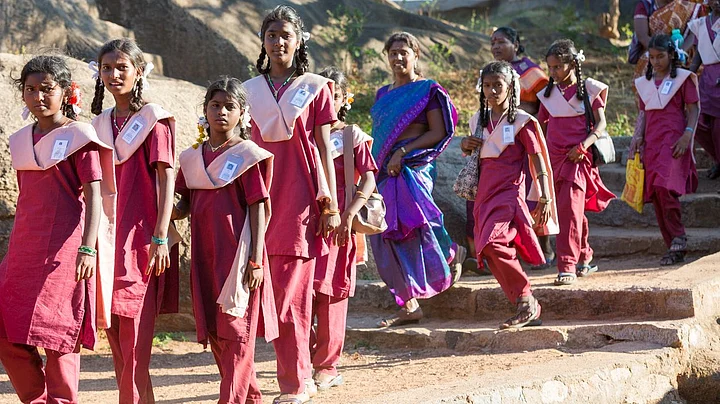Pournami has not yet experienced her first period. But she knows about it. Studying in the 6th standard at Stella Maris Convent School near Thiruvaniyoor, Pournami learned about periods through workshops held at school and discussions with her mother.
She said, “I know everything about puberty and how to manage my menstrual health when I get my periods. I am not scared of it because I know that this is a part of our natural biological processes.”
The onset of puberty in girls begins when they are 8-14 years old. Many girls record their first periods during this time and, some get scared when they spot period blood if they are not taught about it early on. In India, particularly in rural areas, families still find it difficult to discuss this with their daughters. Meanwhile, teachers don’t quite understand how to impart timely period education as it is not part of the curriculum at early standards in school.
But Whisper is de-stigmatizing periods one workshop at a time. They are conducting elementary and comprehensive seminars on puberty, period cycles, and menstrual hygiene management at schools so that girls receive accurate period education. At the same time, they are also driving forward these conversations between parents and children to break down stigma. In 1995, Whisper introduced its Period education program to educate girls and their mothers on menstrual hygiene. To date, Whisper has educated more than 5.4 crore girls on menstrual hygiene, provided access to free menstrual products, and encourages parents to attend these sessions. Creating awareness and acceptance of hygienic menstrual practices can play a significant role in changing this scenario. And the brand is committed to achieving this, particularly as the education system fails.
Jose Mathew, headmaster at St. Mary’s HSS Morakkala, said, “The audio-visual slides and other literature distributed by P&G helped our teachers to impart timely period education to as many as 500 students. But there should be a separate chapter in biology books as well.”
Agreeing with the headmaster, Anitha Paul, Science teacher, Stella Maris Convert School, Thiruvaniyoor, said, “CBSE has included a holistic chapter on reproductive cycles in the biology books of standard 8. There needs to be a separate chapter on menstruation and hormonal health that must be introduced at earlier standards as most girls now record their periods in standard 6 or 7. Teaching these chapters at a later stage makes them redundant. We must teach these concepts to boys as well. Only when the boys are informed and educated will they begin to respect their sisters and mothers.”
Missed school is a missed opportunity. We must ensure girls like Pournami should not miss out on the most important chapter of their life, their school.
Pournami’s tips on how to manage your menstrual health:
Tip 1: You can lead a normal life even on your periods. You can do light exercises, wash your hair and eat pickles.
Tip 2: Use good quality sanitary pads such as Whisper Ultra Clean.
Tip 3: Change your sanitary napkin every 6 hours.
Tip 4: Discard your pad by folding and wrapping it in a towel paper or the sticker of the pad. Throw it in a trash can. Never discard the pad in a toilet as it will only clog the toilet.
Tip 5: Wash your hands for at least 20 seconds each time you avail the washroom.
(At The Quint, we question everything. Play an active role in shaping our journalism by becoming a member today.)
